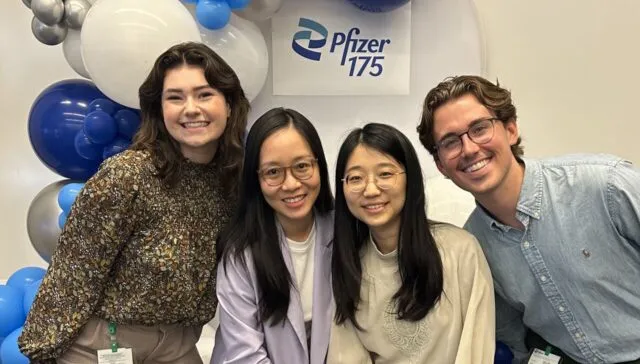Collecting cardiovascular disease data on mobile devices

A BUSPH study using Framingham Heart Study participants measures the success of health data collected on mobile devices vs. traditional research methods.
Let’s open with a question:
Is collecting data on mobile devices as effective as traditional methods when studying cardiovascular disease risk factors?
Let us explore…
Utilizing eCohorts for cardiovascular disease data collection
Mobile healthcare (mHealth) is rapidly gaining popularity. Providers and researchers are finding ways to incorporate traditional study methods onto mobile devices and into this emerging field. eCohort studies are electronic studies conducted over mobile devices using a group of people that share a defining characteristic. These studies offer an efficient approach for data collection (and, specific this case, cardiovascular disease data collection).
Some recent eCohort studies include wearable sensor devices and smartphone technology to collect data from study participants over long periods. However, the major challenges of eCohorts include participant bias and low adherence, which lead to concerns about the generalizability of study results. Previous eCohort studies report a rapid drop-off of study participant engagement within a short amount of time. The majority of participants did not return completed surveys and surveys contained numerous missing values. Thus, discovering ways to maximize adherence rates can provide an opportunity to improve the usefulness of mHealth studies.
But do eCohorts provide similar survey results as traditional cardiovascular disease data collection methods? It is not typical for an eCohort to be embedded within more traditional research cohorts, leaving little opportunity to compare answers from a smartphone app to answers from the same survey, given in the traditional way of pen and paper or on a desktop computer. Our team at Boston University School of Public Health recognized the need for more research to address the validity and reliability of mobile app surveys, which is what the Electronic Framingham Heart Study helps to provide.
What is the Electronic Framingham Heart Study (eFHS)?
The Framingham Heart Study is an ongoing cardiovascular research study in partnership with Boston University that began in 1948. This study consists of the third generation of participants along the Omni group 2 multi-ethnic cohort and New Offspring Spouse cohort and currently follows over 4,500 people over their adult lifetime. Since the study began, it has provided much of the common-knowledge now known around heart disease, like the impact of diet and exercise and the benefits of using aspirin to reduce the risk of a heart attack. In 2016, investigators from the Framingham Heart Study, Boston University School of Medicine, Boston University School of Public Health, and University of Massachusetts Medical School introduced a new eCohort study aptly called, “the Electronic Framingham Heart Study”, or eFHS for short. The eFHS is funded through awards from the Robert Wood Johnson Foundation and the National Heart, Lung, and Blood Institute (Murabito, Benjamin, McManus).
The eFHS is embedded within the ongoing Framingham Heart Study providing us the opportunity to compare smartphone-based app surveys with the same surveys collected during in-person research visits using traditional methods. Importantly, we compare eFHS participants to Framingham Heart Study participants who declined enrollment in the electronically tracked study to understand the generalizability of the online sample.
The eFHS focuses on identifying new cardiovascular disease risk factors in participants using a smartphone app, a digital blood pressure cuff, and a smartwatch. The wireless blood pressure cuff collects participants’ blood pressure levels and the smartwatch collects heart rates and step count information. This various biometric data allows the opportunity for further research.
There are currently 2,151 participants in the eFHS. We found participants in the eFHS are more likely to be married white women who have lower cardiovascular disease risk factor levels compared to participants who did not enroll in the study.
The mobile app we tested is a platform for participants to receive surveys that track their health and biometric data. Participants download the eFHS app and are asked to complete nine different digital baseline surveys, which include sociodemographic information like education level, current employment, and any current medical conditions. Additional follow-up surveys are then distributed every three months over a 12-month period.
 Findings from eFHS response rates across all surveys
Findings from eFHS response rates across all surveys
Upon analysis of the eFHS cohort, our team found that cardiovascular disease data participants were much more engaged at the start of their study participation and completed over 75% of the survey questions asked. The turnaround time for responses was typically within 2 weeks of the request for the baseline and follow-up surveys. Participants took, on average, less than 5 minutes to complete a given survey at each 3-month period.
The response rates decreased over time but remained high compared to other reported eCohorts. We saw a sharp drop-off in response rate at the 12-month survey where only 40% of participants responded to the 12-month questionnaires. We believe this is likely due to the medical history update survey because this survey was longer than the other questionnaires we deployed. It also contained many open-ended questions that required more time to complete. Previous studies support this pattern showing that unrestricted or open-ended questions are less likely to receive responses within app-based surveys. This shows that future eSurvey developers should consider the types of questions asked when employing these types of surveys.
Why did we observe high response rates to app-based surveys?
We observed higher survey completion rates to the eFHS baseline app-based survey and the response rates decreased over time, however, it remained high compared to other reported eCohorts. These results are likely to be higher than other eSurvey studies as the eFHS is embedded into the Framingham Heart Study, which consists of a pool of loyal participants who are highly committed and active within the Framingham Heart Study community. These participants have worked with Framingham Heart Study researchers for years so there is a sense of trust and stronger connection, which could lead to higher baseline app-based survey adherence. The smartphone and other wearable devices may further connect participants to research staff while allowing the participant to gain insight about their own health, which could have the effect of improving long-term engagement.
Another reason for higher engagement could be that participants in the eFHS received numerous reminders and notifications throughout their participation. They received a welcome notification upon enrollment, when new surveys became available, reminders to complete surveys, and thank you notifications when they returned all surveys.
App-based surveys were comparable to the traditionally distributed surveys collected at the research center
Our study demonstrated moderate to high agreement between surveys distributed digitally and those distributed in a traditional research setting. This held true for three different survey types including physical activity, depressive symptoms, and alcohol use. Thus, we believe a digital cardiovascular disease data collection mechanism through a mobile app is a reliable tool to collect data related to cardiovascular disease and its risk factors. The success of this research opens up the possibility of reaching hard-to-reach populations and reducing the costs of traditional studies by using mobile devices.
Chathurangi H. Pathiravasan, PhD, is a Postdoctoral Associate in the department of Biostatistics at Boston University School of Public Health. Her research interests broadly lie at the interface of mobile health applications and various areas of computational statistics, including semiparametric inference, statistical learning and longitudinal models. Her current research is focused on evaluating usage patterns and factors that associated with use of wearable and mobile technologies.




